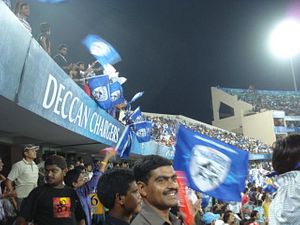India, not exactly known for its sporting prowess, is mad about cricket. It’s the one sport that has brought the country acclaim and pride in the international arena.
Unfortunately, lately it’s become a source of shame as well.
The Indian Premier League, the country’s top professional organization, is falling prey to gamblers, and match fixing has become a scourge. The problem is so out of hand that last week the Board of Control of Cricket in India appointed a panel to launch an official probe.
The eight-team IPL, formed only in 2008, is now one of the richest sports leagues in the world, thanks to television and sponsorship money (the league’s title sponsor is Pepsi). But all that infusion of cash has also attracted the criminal element in India, which is allegedly bribing players to tip matches.
Not necessarily to throw the matches, but to perform certain acts within matches upon which one might wager. In the U.S., only the biggest games (such as the NFL’s Super Bowl) warrant such side action called prop bets. But in Britain, where sports betting is legalized, and in India, all parts of the nitty-gritty of a sporting event are subject to wagering.
A number of IPL’s cricketers have been accused of “spot fixing” the matches. Three Rajasthan Royals bowlers were observed to have signaled their co-conspirators by wearing certain accessories, like a wristwatch or a towel in their belt, prior to the inning in question. They would go as far as lengthening their warm-up time to allow the punters to wager.
The trio, along with 11 bookies, were arrested by Delhi police after a match. Even the bookies turned out to be former cricketers, who arranged the schemes that would pay the current players somewhere between $36,000 to $109,000 for their cooperation.
But sadly, all these criminal activities are nothing new when it comes to cricket in India. Match-fixing suspicions date back to at least 1997. There were major scandals in both 2012 and 2013, but little was done by the governing bodies to crack down on such illicit activities.
And India certainly isn’t unique in its troubles with match fixing. European soccer matches, both club and international, have been routinely influenced by gamblers. In America, where sports betting is only legal in Nevada, there have been criminal cases involving both players and referees.
Sports betting scandals have also rocked professional baseball leagues in Asia. Taiwan’s Chinese Professional Baseball League is on life support now after rampant game fixing that carried on for a decade caused massive fan discontent and abandonment. The Korean Baseball League is still reeling from the 2013 arrest of a coach who threw games in exchange for payments from a gambling syndicate.
Both Taiwan and South Korea have cracked down on the criminal elements and adopted “zero-tolerance” rules in hopes of curtailing game fixing. It appears that at long last, India’s cricket overlords are finally taking responsibility and pledging transparency.
“I am hoping the BCCI will become more open,” BCCI interim chief Sunil Gavaskar told journalists Monday. “Like, maybe at least for the IPL, we are trying to make it open and it will carry on for the rest of the BCCI where there will be healthy discussions where people can speak freely and fearlessly, and involve everyone in the decision-making process.”
“I very strongly feel that there are four major stakeholders – biggest is the fan, the players, the media and the administrators, and the sponsors as well. If all of us work together, we will be able to take the game forward.”
The BCCI has initiated “Operation Clean-Up” to stamp out corruption. The governing body announced it would strictly enforce a code of conduct for players as well as officials and team owners. Access to players is now severely restricted as they are prohibited from attending post-match parties. The BCCI is even mulling a ban on cell phones at matches, lest gamblers on hand can call their bookies.
Whether these measures will regain the public’s confidence in the IPL remains to be seen, but it’s about time for the BCCI to seriously consider reform. After last year’s retirement of cricket legend Sachin Tendulkar, India would not want to see a massive fan defection from the one sport in which the country truly excels.

































